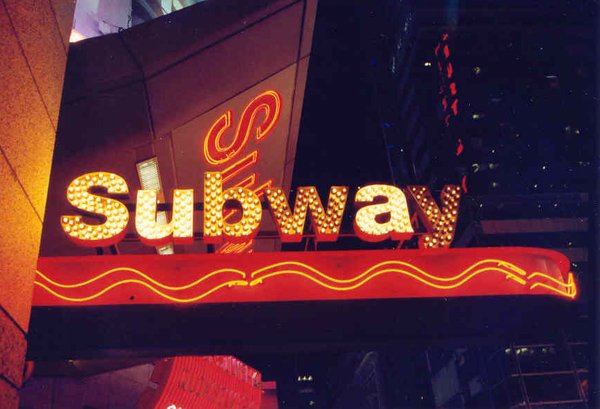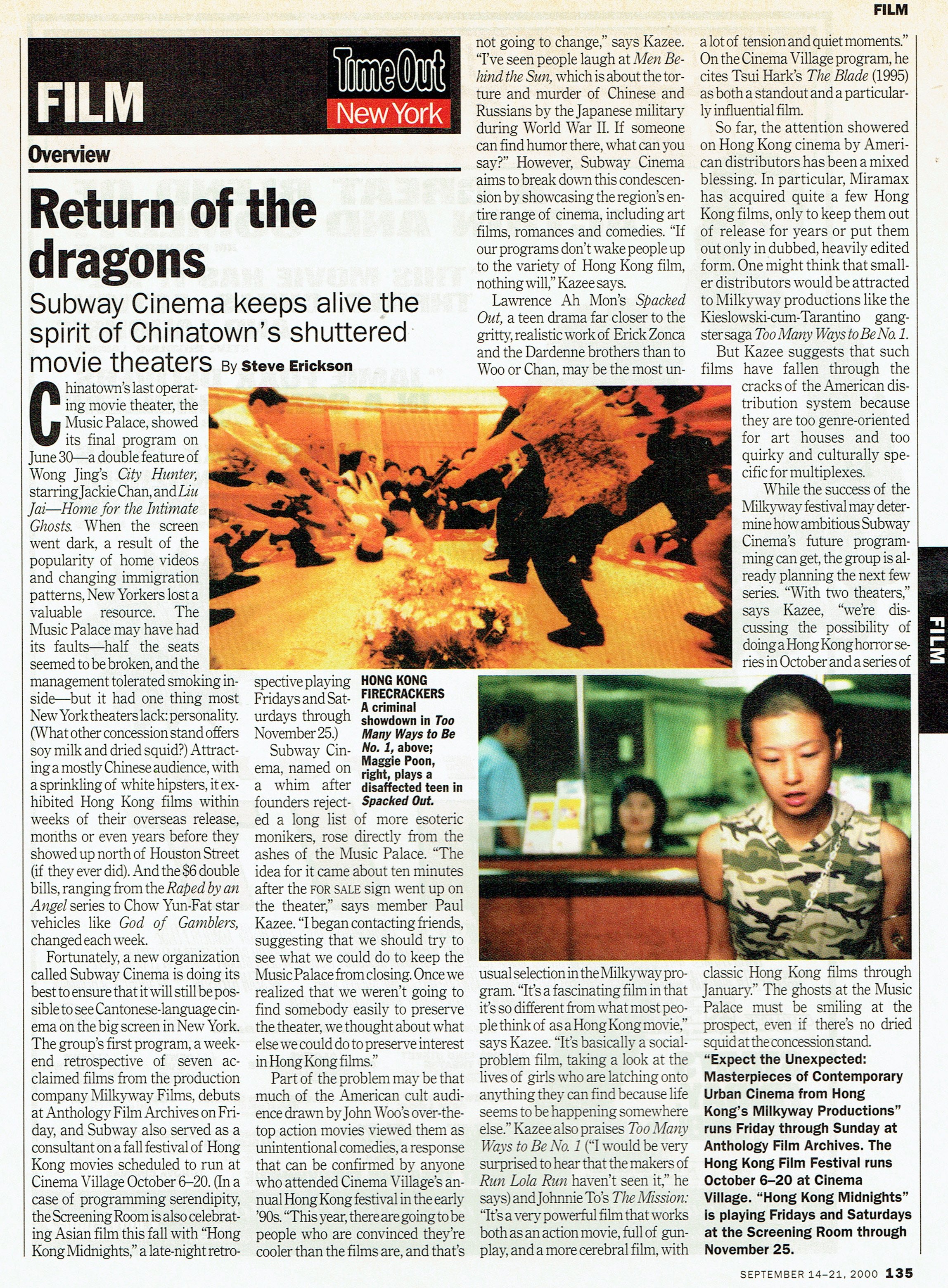
Subway Cinema.
Subway Cinema Inc. is a New York-based 501(c)(3) not-for-profit volunteer-run organization dedicated to the exhibition and appreciation of Asian popular cinema and preservation of America’s Asian film exhibition heritage. Today it is run by three of its founders, Paul Kazee, Goran Topalovic, and Grady Hendrix.
Founded in 1999 in New York City as a labor of love for five film fans (Paul Kazee, Grady Hendrix, Brian Naas, Nat Olson, and Goran Topalovic), the organization has played a key role in nurturing the growth of Asian film culture in the U.S. by championing the works of Johnnie To, Tsui Hark, Park Chan-wook, Bong Joon-ho, Takashi Miike, Kim Jee-woon, Ryoo Seung-wan, Seijin Suzuki, Sion Sono, and other notable directors.
Subway Cinema was the first in America to recognize the works of Hong Kong genre masters Johnnie To and Tsui Hark with retrospectives and to bring wider attention to New Korean Cinema with When Korean Cinema Attacks! - the New York Korean Film Festival 2001.
In 2002, Subway Cinema launched the annual New York Asian Film Festival (NYAFF), which it produced and programmed for 16 consecutive years, establishing it as North America’s leading festival for popular Asian cinema. In 2013, in collaboration with Film at Lincoln Center, Subway Cinema put together the largest retrospective of auteur/superstar Jackie Chan's films in North America (The Jackie Chan Experience).
Today, Subway Cinema’s primary focus is on retrospective programming and on the preservation of America’s heritage of Asian film exhibition. Current events include Old School Kung Fu Fest (a showcase for the best of classic martial arts films), the Hong-Kong-a-Thon! (12-hour marathons of classic Hong Kong genre films from the 80s and 90s), and Sundays on Fire at the Nitehawk Prospect Park. In 2019, Subway Cinema teamed up with Film at Lincoln Center for the largest North American retrospective of New Korean Cinema (Relentless Invention: New Korean Cinema, 1996-2003).
Over the years, Subway Cinema has received generous support from Hong Kong Economic and Trade Office New York, Korean Cultural Center New York, Taipei Cultural Center in New York, Ministry of Culture, Republic of China (Taiwan), The Korea Society, and Kenneth A. Cowin Foundation, among others.
NOTE: Subway Cinema and its founders are not affiliated with the New York Asian Film Festival Foundation, which has taken over the sole responsibility for producing and curating the annual New York Asian Film Festival since 2018, under the license granted to it by Subway Cinema.


“The NYC genre gurus.”
— Indiewire
“Asian film buffs whose eclectic tastes run from the wildest Korean shoot-‘em-ups to the most restrained and contemplative Japanese dramas.”
— The New York Times
“Ardent and inspired team.”
— New York Press
“Subway has been serving up one of the most diverse selections of Asian films in the country.”
— Indiewire
“Impassioned film fanatics.”
— The Brooklyn Rail

New York Asian Film Festival.
In 2002, Subway Cinema launched the legendary New York Asian Film Festival (NYAFF) at Anthology Film Archives, with the simple goal of entertaining the audience with its program of blockbusters, newsmakers, trend-setters, and the scandalous releases, skipping all the arthouse snoozers that represented Asian cinema to most other film festivals at that time.
Subway Cinema went on to program and produce NYAFF for 17 consecutive years, growing it from a week-long 10-film event in East Village to North America’s leading festival of popular Asian cinema that screens 50+ films over 2 weeks across multiple venues.
From 2007-2014, the main portion of NYAFF’s Japanese selections were co-presented in association with Japan Cuts: Festival of New Japanese Film, organized by Japan Society.
Starting in 2010, NYAFF become a co-presentation between Subway Cinema and Film at Lincoln Center (formerly known as the Film Society of Lincoln Center), with the Walter Read Theater becoming the Festival’s main venue, which boosted NYAFF’s international profile and helped attract Asia’s top filmmakers and actors to attend the Festival, including Jackie Chan, Tsui Hark, Donnie Yen, Sammo Hung, Choi Min-sik, Simon Yam, and many others.
NYAFF is now under the care of the New York Asian Film Foundation, which has taken over the programming and production of the festival in 2018, under the license granted by Subway Cinema.


“the filmmakers [Subway Cinema] has championed have garnered wider recognition from the American audience: names such as Mr. Tsui [Hark], Johnnie To, Takashi Miike, Park Chan-wook, Bong Joon-ho, Seijun Suzuki, Sion Sono...”.
The Wall Street Journal

Old School Kung Fu Fest.
Launched in 2000, Subway Cinema’s Old School Kung Fu Fest (OSKFF) is an aperiodic celebration of the rarest, wildest, and most incredible martial arts and action cinema from the ‘60s, ‘70s, ‘80s, and ‘90s. Designed for the maximum audience enjoyment and carefully curated by the Asian cinema experts at Subway Cinema, OSKFF “brings back memories of the days when you could see a double feature at an atmospheric Times Square Theater for half-price” (Daily News)
OSKFF has received coverage from the Wall Street Journal, IndieWire, Entertainment Weekly, Daily News, Time Out New York, Birth.Movies.Death, Screen Anarchy, Brooklyn Magazine, CriterionCast, South China Morning Post, Eastern Kicks, etc.
Past editions of the OSKFF have taken place at Anthology Film Archives, Cinema Village, Metrograph, and Museum of the Moving Image, and have been supported by Hong Kong Economic and Trade Office New York, Taipei Cultural Center in New York, Ministry of Culture, Republic of China (Taiwan), and Warner Archive.
Our Team.
Grady Hendrix.
Grady Hendrix is one of the co-founders of the New York Asian Film Festival, which is the best thing he's ever done. Otherwise, he lurks in New York City, writing books about haunted IKEAs (Horrorstör), children possessed by Satan (My Best Friend's Exorcism), heavy metal musicians possessed by Satan (We Sold Our Souls), or book clubs attacked by vampires (The Southern Book Club's Guide to Slaying Vampires). These books are nothing but a pack of lies. He wrote one non-fiction book about horror paperbacks (Paperbacks from Hell) but that book has Nazi leprechauns on the cover so it's better not to think about it. He wrote the Netflix documentary, Iron Fists and Kung Fu Kicks, but other people were involved so he probably didn't even do any of the work. You make yourself sick reading about him at www.gradyhendrix.com.
Paul Kazee.
As a co-founder/director of Subway Cinema and the New York Asian Film Festival, Paul was instrumental in bringing the individual members together, developing a structure, and in expanding the organization’s reach from its Hong Kong and Korean roots to the rest of Asia.
Outside of Subway Cinema, Paul continues to premiere foreign and fringe cinema to wildly enthusiastic audiences in and around Albany, NY. Paul serves as a film programmer and event host for the Proctors Collaborative art center, while also programming and hosting annual drive-in movie theatre events, often featuring 35mm prints of films from around the world.
Paul was a regular contributor to Joe Bob Brigg's Joe Bob Report, and has had his film reviews published in the South China Morning Post and MeniscusZine.com. His writing can also be found in Hidden Horror, a collection of genre film essays.
Paul also proudly served as a member of the Cheval Noir jury for the Fantasia International Film Festival in 2017. The Cheval Noir award is that festival’s most prestigious prize.
Goran Topalovic.
As one of the founders of Subway Cinema and the New York Asian Film Festival (NYAFF), Goran’s curatorial focus has been on classic and contemporary films from Hong Kong, South Korea, and Taiwan. During his tenure as Subway Cinema's Executive Director (2011-2015), NYAFF strengthened the ties with partner organizations at home and abroad, increased its international profile, and became able to attract Asia’s A-list talent, including Jackie Chan, Donnie Yen and Choi Min-sik.
As a journalist, Goran has written for Film Comment, Cine 21 (Korea), and a bunch of other print publications that no longer exist. He has been invited to speak at New York University, The Nam Center for Korean Studies at the University of Michigan, CUNY Hunter College, Asia Society New York, Brooklyn Academy of Music’s BAMcinématek, and Korean Cultural Center New York, and has served on the juries of several international film festivals.
linktr.ee/goranarts

